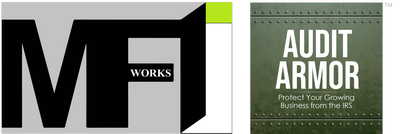FAQ (Frequently Asked Questions)
MFI Works Helps Business Owners Buy Homes.
When starting a business, there are many different business entities to choose from, and selecting the right type is vital to your business’s success. S-Corporations and LLCs differ in many ways, from management structure to taxes. For example, S-corporation’s tax status eliminates double taxation, but it lacks the flexibility an LLC has in allocating income to the owners. An LLC can have an unlimited number of members, while an S-Corp is limited to 100 shareholders.
Your business entity choice will affect your management structure, business taxes, and ability to form subsidiaries and issue stock. For help choosing the best entity for your business, feel free to contact us!
Yes! MFI Works has helped resolve many audits in the past, and we can help you prepare for your IRS audit.
We help our clients avoid problems that would require representation before the IRS.
MFI Works offers business financial coaching, tax planning, tax preparation, loan + property coaching and coordinating, and real estate acquisition planning. We work with business owners that own service-based businesses and work well with consultants and real estate agents. We help business owners optimize their tax situation to ensure they save without increasing their audit risk.
Ideally, you want to pay as close to the right amount as possible. You want to avoid penalties and interest from underpayment, and you don’t want the IRS to hold on to your money from overpayment. We recommend keeping up with your bookkeeping every quarter, not just at the end of the year. By tracking your business income and expenses, we can easily estimate your tax liability and pay the correct amount. To ensure you pay the right amount on your business taxes, schedule your free business strategy session at https://calendly.com/mfiworks.
During an IRS audit, you can expect in-depth questioning about your expenses, business operations, and purchasing history. The auditor is checking if you have reported expenses, losses, taxable income, and deductions in compliance with federal tax laws.
Take a deep breath, gather your records, and contact a professional. We do not advise going through an audit alone. Auditors are trained and skilled at getting information they can use against you.
Here is how the IRS defines the Qualified Business Income deduction:
“Many owners of sole proprietorships, partnerships, S corporations and some trusts and estates may be eligible for a qualified business income (QBI) deduction – also called Section 199A – for tax years beginning after December 31, 2017. The deduction allows eligible taxpayers to deduct up to 20 percent of their qualified business income (QBI), plus 20 percent of qualified real estate investment trust (REIT) dividends and qualified publicly traded partnership (PTP) income. Income earned through a C corporation or by providing services as an employee is not eligible for the deduction. For more information on what qualifies as a trade or business, see Determining your qualified trades or businesses in Publication 535.”
We encourage you to reach out to us to learn more about your business’s tax and income deductions.
Absolutely! We’ll take an in-depth look into your business and expenses to determine which items are deductible.
Tax planning refers to the activities taken well before the tax year is over in order to minimize a business owner’s tax liabilities. We do this by ensuring all available deductions, allowances, exemptions, and exclusions work together to reduce the total tax bill. In addition to lowering taxable income, tax planning can give business owners more control over when their taxes get paid. Tax planning can help business owners achieve their financial and business goals. The tax year is usually over on December 31st for most business owners.
